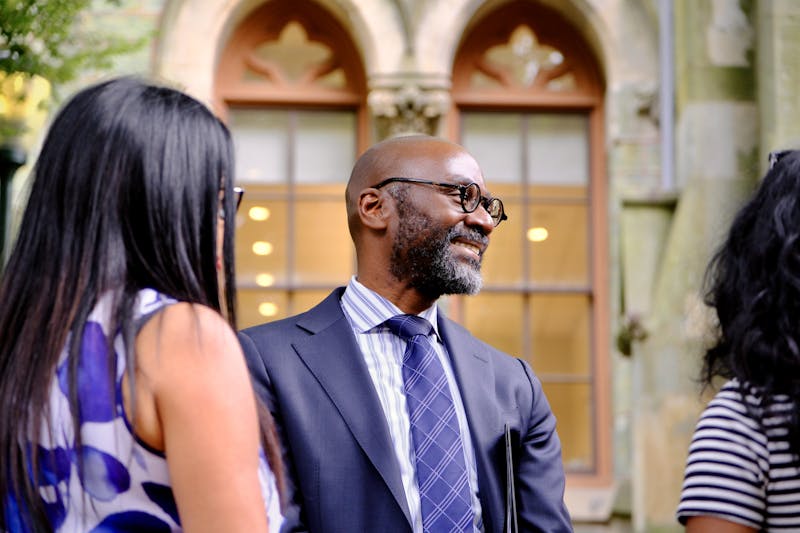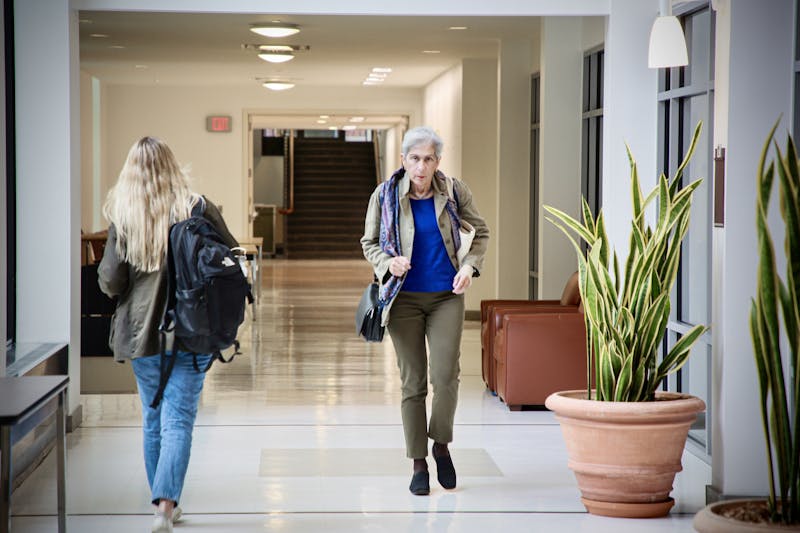For South Africa, a net exporter of agricultural products, it may seem strange that the new year brought an import of squash.
On Dec. 30, the Penn women's squash team boarded a plane and traveled 25 hours to Cape Town, South Africa.
The NCAA allows squash teams to take one trip every four years, and coach Jack Wyant decided to take full advantage of the opportunity this year to give his team a cultural and athletic experience unlike any other.
"We knew that if we traveled there we would get good matches," Wyant said. "We would see what squash is like in another country."
During their trip, which lasted from Jan. 1 to Jan. 8, the Quakers played four matches against four different teams from three different squash clubs. It was all set up through Wyant's connections with South Africa national coach Richard Castle, whom he met at the World Junior Championships.
The matches were not unique because of any differences in playing styles between players from the two countries, but rather due to the fact that the other teams were mostly made up of men over twice the age of their female Penn opponents. This resulted in some matches that co-captain Chloe Wynne described simply as "pretty hilarious."
Yet the Quakers were still able to defeat most of their opponents, winning three of their four matches. They fell only to Paarl Squash Club in their final contest, after previously beating two clubs from the Durbanville Squash Club and one from the Western Provinces Cricket Club.
Both the winners and losers remained in good spirits before, during, and after the match. Wyant contrasted the "cutthroat" junior national circuit - with which most of the team is familiar - to the "competitive yet friendly" atmosphere of the sport in other countries. After every match, the host squad would hold a braai, or barbecue, with the visiting Quakers.
"The men that we played were extremely gracious to us as hosts," co-captain Elizabeth Kern said. "But as soon as they got on court, they were ready to play."
The friendly sentiments were echoed by the South African competition. Steve Smith, section chairman at the WPCC, was impressed and surprised by the amicable attitudes the Quakers displayed despite their vast differences.
"Although many of their opponents were many years older, it was notable how they were all involved in animated one-on-one conversations with each other," Smith said in an e-mail.
"I would have half-expected most of the girls to chat briefly with their opponents, and then gather together as a bunch and discuss whatever it is that 20-something girls chat about."
The Quakers also had to adjust to the weather difference. Squash season in the U.S. is during the winter, whereas playing in the South African heat increases the elasticity of the ball - enabling the women to reach shots they normally could not.
The Red and Blue kept busy during the trip, even during their breaks from training and competing. They stayed in Cape Town the entire trip, seeing everything the city has to offer. The only notable exception was Robben Island, the prison where Nelson Mandela was held, which the team could not visit due to poor weather conditions.
Trevor Davies, the team's tour guide and squash opponent, described the trip's itinerary in an e-mail as "showing the group a mixture of Cape Town in terms of natural sights, educational interests and mixing with local players."
The major "natural sight" of the Cape Town area is Table Mountain, which the team ascended during its journey. In their blog, juniors Alisha Turner and Emily Goodwin described the experience as a "feeling of being on top of the world."
"Educational interests" included a tour of a local township surrounding the Cape Town area. The women found it a far cry from the wealthy area where they stayed, and recognized the unique value they could gain from the experience.
"We got to do something which most people never get the chance to do, which is see the third world conditions these people are living in," Kern said.
The team also enjoyed a safari, in which they saw a variety of animals, including elephants, springboks, a giraffe and even a lion - a rare sighting.
One of Kern's favorite parts of the trip was an excursion to the Indian Ocean, where only Kristen Lange, the nation's No. 2 collegiate squash player, was willing to brave the "freezing cold" water just to say she had walked in it.
This and other stories contributed to improved team unity, another goal of the experience.
"We go on road trips where we're together for two or three days at a time, but this was almost ten days," Wyant said. "It was an opportunity for us to have a lot of laughs and support each other in matches and see and do some things we obviously don't get to do over the course of a normal season."
A surprising benefit of the trip was the realization of the expansiveness of the Penn community. In their first three days in Cape Town, the players met the husband of a professor, a father of an incoming freshman and a Penn graduate from 1959.
"It's absolutely amazing to truly come face-to-face with the immense extent of Penn's global network," Kern and junior Anita Sellers wrote in their blog.
But in addition to training the Quakers and providing them with a special opportunity, Wyant was on a business mission. He hoped that the trip would help him build connections that would result in recruits down the road. South Africa has produced a number of world-class squash players, including Yale's No. 1, Aaron Fuchs, and former world No. 1 Natalie Grainger.
In the end, though, the No. 2 Quakers know that the lessons gained from the journey will stay with the team throughout the rest of the season, and, they hope, lead to a national championship.
Kern was quick to point out the appreciation their middle-aged opponents showed for the sport, as well as Castle's inspirational speech before one of their training sessions.
"In order to make sure you reach your potential not only as an individual player, but as a team, you have to practice when you're tired and you have to put in that extra time even outside of practice," Kern recalled him saying.
And even if the trip does not benefit their season as much as they might, the players can always remember what Wyant, Wynne and Kern all referred to as "the experience of a lifetime."
The Daily Pennsylvanian is an independent, student-run newspaper. Please consider making a donation to support the coverage that shapes the University. Your generosity ensures a future of strong journalism at Penn.
DonatePlease note All comments are eligible for publication in The Daily Pennsylvanian.







